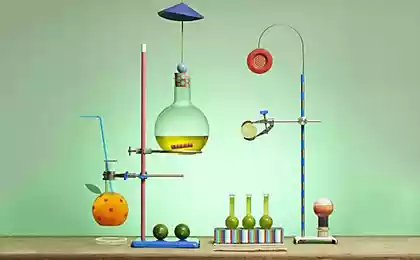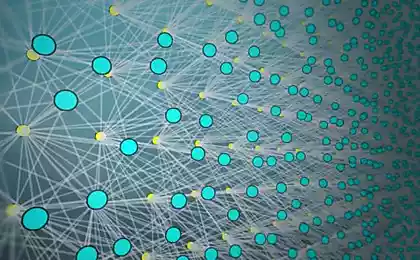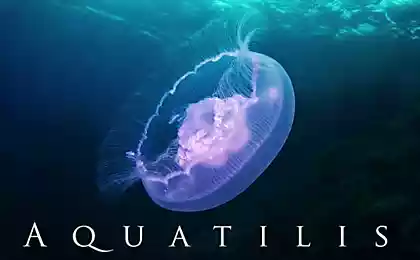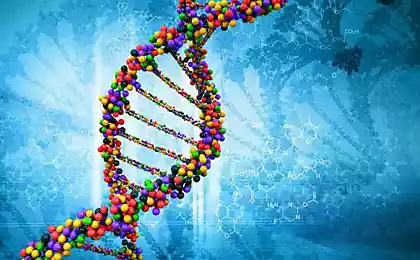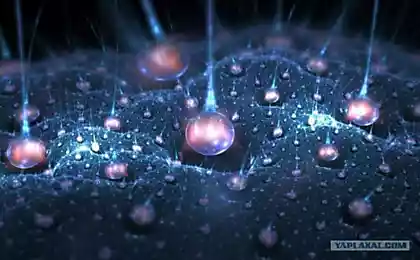11 new areas of science, which is important to know
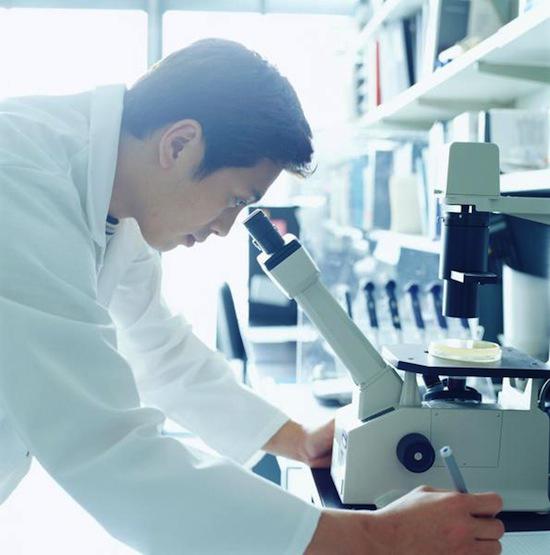
There was a time when science can be divided into the vast and relatively understandable disciplines - biology, chemistry, physics, astronomy. But today, every region is becoming more specialized and thus is closely related to other disciplines, which leads to the emergence of entirely new branches of science. We offer you a selection of 11 of the latest scientific trends, is actively developing in the 21st century.
1. Neyroparazitologiya 73,124,838
If you know of Toxoplasma, mostly living in felines, but can reside in other warm-blooded animals, including humans and rats, then you know about neyroparazitologii. The fact that these creepy pests now have its own discipline, shows how they are distributed in nature.
Microparasites usually change the behavior of the media in accordance with the needs of their reproductive strategy. Often involved in the process and a third party. For example, Euhaplorchis californiensis causes the fish jump out of the water to wetland birds can catch them and eat. Hair worms live inside grasshoppers, and when it is time to leave their vehicles, they release into the blood of insects a cocktail of chemicals, forcing grasshoppers to commit suicide by jumping into the water. A hair worms quietly float away from the dead "masters».
2. Quantum Biology 66,703,737
Physicists have known for over a century of quantum effects, such as the ability of photons disappear in one place and reappear in another, or be in two places at once. However, the amazing properties of quantum mechanics apply not only in physics but also in biology.
The best example of quantum biology - photosynthesis: plants and some bacteria use energy from sunlight to build molecules they need. It turns out that photosynthesis is actually based on a striking phenomenon - a small mass of energy "exploring" all possible avenues for self-application, and then "choose" the most effective. Perhaps navigation birds, DNA mutation, and even our sense of smell anyway rely on quantum effects. Although this area of science is highly speculative and controversial, the researchers believe that once gleaned from quantum biology ideas can lead to new medicines and biomimetic systems (biomimetrika - another new research field where biological systems and structures are used to create new materials and devices ).
3. Ekzometeorologiya 70,928,431
Along with ekzookeanografami and ekzogeologami, ekzometeorologi interested in the study of natural processes occurring on other planets. Now, thanks to powerful telescopes when it became possible to study the internal processes at the nearby planets and satellites, ekzometeorologi can monitor their atmospheric and weather conditions. Jupiter and Saturn with its incredible scale weather events - the first candidates for research, as well as Mars, with regular dust storms.
Ekzometeorologi learn even a planet outside our solar system. And interestingly, they may eventually find signs of extraterrestrial life on extrasolar planets by detecting an atmosphere of organic traces or increased carbon dioxide levels - a sign of industrial civilization.
4. Nutrigenomics 11,138,014
Nutrigenomics - the study of the complex relationship between food and the expression of the genome. Scientists working in this area, seeking to understand the role of genetic variations and dietary responses to the way it nutrients affect gene.
Food does have a huge impact on health - and all begins literally at the molecular level. Nutrigenomics works both ways: studying how our genome affects food preferences, and vice versa. The main goal of discipline is to create a personalized food - it is necessary to ensure that our food is ideally suited to our unique set of genes.
5. cliodynamics 26,183,965
Cliodynamics - a discipline that combines historical macrosociology, economic history (cliometrics), mathematical modeling of long-term social processes, as well as the systematization and analysis of historical data.
The name comes from the Greek muse of history and poetry Clio. Simply put, cliodynamics - is an attempt to predict and describe the broader social history of communication - and to study the past, and as a potential way to predict the future, for example, forecasts of social unrest.
6. Synthetic biology 23,345,617
Synthetic biology - is the design and construction of new biological parts, devices and systems. It also includes the modernization of existing biological systems to an infinite number of useful applications.
Craig Venter, one of the leading specialists in this field, said in 2008, the year that he recreated the entire genome of the bacterium by gluing its chemical components. Two years later, his team created a "synthetic life" - the DNA molecule by using a numeric code, and then printed on 3D-printer and embedded in a living bacterium.
In the future, biologists are going to analyze the different types of genome to create useful organisms for introduction into the body and bio-robots that will be able to produce chemicals - biofuels - from scratch. There is also the idea of creating an artificial pollution-fighting bacteria or a vaccine for the treatment of serious diseases. The potential of this scientific discipline just huge.
7. Recombinant memetics 61,305,557
This area of science is in its infancy, but it is already clear that it is only a matter of time - sooner or later, scientists will have a better understanding of the whole human noosphere (the aggregate of all known people to information), and how the dissemination of information affects almost every aspect of human life.
Like the recombinant DNA, where the different genetic sequences come together to create something new, recombinant memetics examines how memes - ideas that are transmitted from person to person - can be adjusted and combined with other memes and memepleksami - well-established set of interrelated memes. This can be useful in the "socio-therapeutic" purposes, for example, to combat the spread of radical and extremist ideologies.
8. Computational sociology 39,687,867
As cliodynamics, computational sociology is studying social phenomena and trends. The central place in this discipline takes the use of computers and related technology information processing. Of course, this discipline was developed with only the advent of computers and the ubiquity of the Internet.
Particular attention is paid to the discipline huge flow of information from our daily life, such as e-mails, phone calls, posts on social networks, shopping on a credit card, a search engine, and so on. Examples of work can serve as a study of the structure of social networks and how information is distributed through them, or as in the Internet there are intimate relationships.
9. Cognitive Economics 57,753,629
As a rule, the economy is not linked to the traditional disciplines, but that may change due to the close cooperation between all branches of science. This is often confused with the discipline of behavioral economics (the study of behavior in the context of our economic decisions). Cognitive the economy - the science of how we think. Lee Caldwell, author of a blog on the subject, wrote about her:
«cognitive (or financial) economy ... draws attention to what is really going on in the mind of a person when he makes a choice. Which represents the internal structure of the decision that it affects what information at this point receives intelligence and how it is processed, which in humans internal forms preferences and, ultimately, all these processes are reflected in the behavior of? ».
blockquote> In other words, scientists begin their studies at a lower, simplified level, and form a microscopic model of decision-making principles for the development of large-scale models of economic behavior. Often this discipline interacts with the adjacent areas, such as computational economics or cognitive science.
10 Plastic electronics 96,478,263
Usually electronics associated with inert and inorganic semiconductors and conductors such as copper and silicon. But a new branch of electronics using conductive polymers and conductive small molecules, which are based on carbon. Organic electronics involves the design, synthesis and processing of functional organic and inorganic materials, along with the development of advanced micro and nanotechnology.
In truth, this is not such a new branch of science, the first development were made back in the 1970s. However, everything turned out to bring together the data came only recently, in particular, due to the nanotechnology revolution. Due to the organic electronics we may soon appear organic solar cells, self-organizing monolayers in electronic devices and organic prosthesis, which in the future will be able to replace the person damaged limbs: in the future, so-called cyborgs, quite possibly, will consist largely of organic than synthetic parts.
11. Computational biology 26,474,918
If you like the same mathematics and biology, this discipline is just for you. Computational biology seeks to understand the biological processes through the language of mathematics. It is equally used for other quantitative systems, such as physics and computer science. Scientists from the University of Ottawa to explain how this was possible:
«As the Biological Instrumentation and to easy access to computing power, biology itself has to operate an increasing number of data, and the rate of acquired knowledge while only increasing. Thus, the interpretation of the data now requires a computational approach. At the same time, from the point of view of physics and mathematics, biology has grown to the point where theoretical models of biological mechanisms can be tested experimentally. This led to the development of computational biology. »
blockquote> Scientists working in the field, analyze and measure everything from molecules and ending ecosystems.
via factroom.ru
